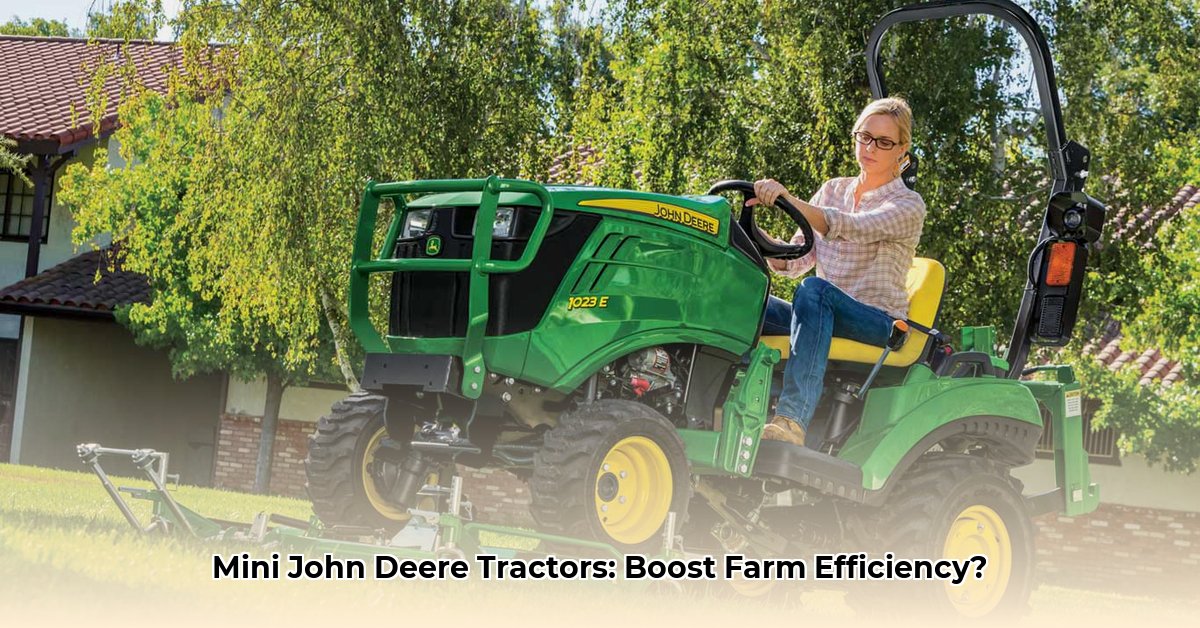
Farming today demands a delicate balance: sustainability, efficiency, and profitability are all critical. John Deere's mini tractors offer a powerful solution, providing a range of options to meet diverse farming needs. This article explores the Deere compact tractor series, comparing models, highlighting sustainable applications, and guiding you through the selection process. For parts and more information, check out the Deere parts website. Whether you're a small-scale organic farmer or manage a larger operation, a mini John Deere tractor can significantly enhance your farm's productivity and bottom line.
Deere's Compact Tractor Lineup: A Scalable Solution
John Deere's compact tractor series isn't just about size; it's about scalability. Imagine a perfectly-sized toolbox for your farm. That's the core concept behind Deere's tiered system, offering a tractor to match nearly any farming operation. From small orchards to large-scale farms, there's a Deere compact tractor ready to optimize your work.
The series are divided into four tiers: 1, 2, 3, and 4. Each offers varying horsepower and capabilities, carefully designed to meet specific needs. While John Deere emphasizes the efficiency features of these tractors, more detailed public data on their environmental impact would further strengthen their sustainability claims. This lack of publicly available information presents an area for improvement in transparency.
Comparing the Series: Finding the Right Fit
This table summarizes the key features of each series. Remember, these are approximate ranges; consult official John Deere specifications before purchasing.
| Series | Horsepower Range | Typical Applications | Lifting Capacity (approx.) | Ideal Farm Size |
|---|---|---|---|---|
| 1 Series | Under 25 HP | Small gardens, landscaping, hobby farms, residential use | Light | Small properties, homeowners |
| 2 Series | 25-40 HP | Orchards, vineyards, smaller farms, specialized tasks | Medium | Smaller farms, specialized work |
| 3 Series | 40-60 HP | Row cropping, hay production, livestock operations | High | Medium-sized farms |
| 4 Series | Over 60 HP | Large-scale farming, heavy-duty tasks, large acreage | Very High | Large farms, demanding tasks |
Beyond horsepower and lifting capacity, consider the array of available implements. Matching your tractor's capabilities to your specific needs is crucial for maximizing efficiency and avoiding unnecessary expenses.
Sustainable Farming Applications
Many Deere compact tractors feature hydrostatic transmissions. This allows for smooth, precise control, minimizing soil compaction and resource waste. This precision is invaluable for sustainable practices like precision planting, optimizing yields while minimizing environmental impact. The wide range of compatible implements further enhances versatility, allowing farmers to tailor their machines to individual needs. However, additional data on long-term fuel efficiency and emissions per model would improve the overall sustainability assessment. Don't you want to minimize your environmental footprint and maximize your farm's efficiency?
Selecting Your Mini John Deere Tractor: A Step-by-Step Guide
Choosing the right compact tractor requires careful consideration. Follow these steps:
- Assess Your Needs: Honestly evaluate your farm's size, typical tasks, and budget. This critical step clarifies your requirements.
- Check Implement Compatibility: Ensure the tractor is compatible with the necessary implements.
- Prioritize Operator Comfort and Safety: Consider features like enclosed cabs for all-weather operation and enhanced safety.
- Factor in Maintenance: Research maintenance schedules and costs as part of your budget.
- Consult Your Local John Deere Dealer: A dealer visit provides invaluable hands-on experience and personalized advice.
Following these steps will significantly improve your chances of making a sound, sustainable investment.
The Future of Farming and Mini John Deere Tractors
Agriculture is evolving rapidly, emphasizing sustainability and efficiency. Mini John Deere tractors, with their adaptability and integration potential with precision agriculture technologies, play a pivotal role. However, greater transparency regarding their environmental footprint – particularly fuel efficiency and emissions data – is crucial. This is key to ensuring farmers can make truly informed, environmentally responsible purchasing decisions and contribute to a sustainable future.
Key Takeaways:
- Deere compact tractors offer a solution for almost any farm size's needs.
- Scalability means you can find a tractor that fits your budget and your workload.
- Careful consideration of your needs is key to choosing the most efficient and sustainable model.